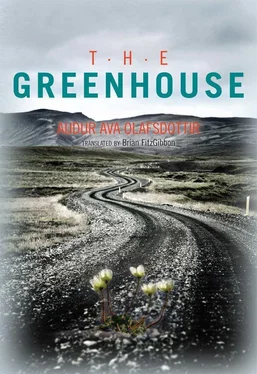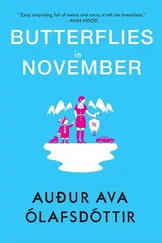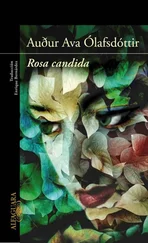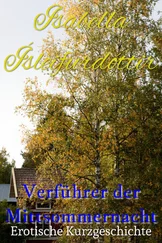— What? she asks and smiles at me.
— Nothing.
— Yeah, what? she says again. Why are you looking at me?
— I’m trying to work out what kind of a person the daughter of a ptarmigan hunter is.
— Deep inside? she asks, looking at me with her aquamarine eyes.
While the duck is in the oven I walk all the way down to the car to get the box with the remainder of the wine bottles. On the way up I meet Father Thomas and grab the opportunity to hand him two bottles.
— To be compared with your own production, I say. He tells me that they’re all happy to have me back in the garden after my brief absence and that the monks are showing more interest in the garden than they did before.
— They’re spending more time outside, he says, and they’re realizing that it’s good for them to get some fresh air. Brother Paul tried to water a few flower beds and got his feet wet for the first time in twenty years, but was grateful to be back in touch with Mother Nature again. They’re also all very happy about the way you’ve marked the roses. Now one can walk down the rose garden’s old paths again and practice one’s Latin by reading the names of the plants on the labels.
When I get back to the apartment, Anna has placed the side dishes on the table and is taking the duck out of the oven. Flóra Sól sits ready in her chair with her bib on and a spoon in her hand. It’s got to be said, the food is delicious, but neither of us has much appetite. I admit I don’t want to sleep on the sofa bed anymore, not when there are two places in the bed in the next room. When I’m about to stand up to bathe Flóra Sól and put her to bed, Anna halts me and says:
— I’ll do it.
Looking out into the darkness through the kitchen window, I make out some lights in several windows of the monastery up on the hill. Tomorrow I’ll mow the lawns and take the garden benches out of the storage room and give them a coat of oil. Then I’ll sow various types of salad in the new beds and continue to work on the patches of spices.
I finish clearing up inside and walk straight into the bedroom, get into bed, and gently pull the quilt off Anna.
By the time Flóra Sól wakes up in the morning and stands up on the cot, we haven’t slept much. I won’t deny that I’ve started to think of the world like this: there’s the two of us, then the others. Sometimes I feel the child is in our group, and the two of us and the child are one, and sometimes I feel the child belongs to the group with the others.

Although we haven’t said a single word about our relationship, I’m nevertheless acquiring my first experience of being a couple with a child. Living with another person is no hassle at all, as long as you can make love to them. Even though my position isn’t exactly clear, I’m still happy and excited, although I wouldn’t exactly say that to anyone in those words out loud.
Anna is still immersed in her books and still lost in her thoughts, as if she were both present and distant at the same time. Except in bed, she’s not distant there. Sometimes it’s as if she doesn’t notice me until we’re both in bed. Then everything changes. Another life takes over once we’re under the sheets; outside it, during the day, we’re more like brother and sister. We’ve even been asked on the street if we were siblings. We don’t hold hands on the street; we don’t kiss during the day. We’re like siblings when we take a stroll with the child or sit opposite each other with her, eating the dinners that we cook in turn. I’ve become more audacious than I was in my cooking, and because I really want to surprise Anna, I give in to my butcher and buy something he recommends: deer fillets.
Still, the night has started to contaminate the day, and the effects of what we get up to after hours stretch into the day. We’re more hesitant and shy and talk less together during the day than we did before, because we’re thinking about what’s in store for the night. Sometimes I start thinking of the night straight after lunch and actually spend the whole day looking forward to going to bed.
In fact, we only really talk about things that are related to the child, although Anna still praises my cooking when I do it. I don’t have much appetite in the evenings myself, but Anna always eats well. Neither of us makes any reference to what we are about to do, and we’re both equally fast at bathing the child and tidying up.
Our daughter does us the favor of falling asleep as soon as her head hits the pillow. She sucks her pacifier with her rabbit beside her on the cushion and, a few moments later, dozes off. The child is perfect in every area, all day long. When I come back in, once Flóra Sól is asleep, Anna slams her book closed and stands up. We pay no heed to the fact that it’s only eight o’clock and drop everything we have, books and clothes, and move to the bed without saying a word. There’s nothing to disturb us; we’ve no television, no news of wars and men slaughtering each other, and we get no visits either, so we can speed up our daughter’s dinnertime and putting her to bed; she doesn’t mind. Sometimes we’re in more of a hurry and we just leave the dishes on the table until the next day. The bed is a world of its own, where external laws don’t apply. We’re increasingly sparse in our use of words; you don’t have to be able to express everything in words either. I can hear the priest’s voice, and white subtitles appear on the ceiling, twenty feet above the bed, across the wings of the dove:
The longing in this case relates a great deal to the flesh .

My daughter is having her afternoon nap and I’m standing in front of my lover who is reading at the table. She immediately puts her book down.
My intention was to tell her that I’m going up to the garden, but I surprise myself by saying something completely different:
— I was wondering if we could have a talk. About us.
— What do you mean about us?
— If we could discuss the status of our relationship.
She seems surprised.
— What status?
She says this in a low voice, averting her gaze. She’s still holding the pen. That means that she hasn’t stopped doing what she was doing before I interrupted her; she’s just going to pause briefly to answer one or two questions. In the evenings she puts her pen down as soon as I’ve put the child to sleep. But not now. She’s not ready to discuss our relationship, it’s not the time, I was too quick, I didn’t choose the right moment. Actually, I’ve very little to say about the matter myself.
— We sleep together.
There’s a vast chasm between what I’m saying and what I’m thinking.
— Yes?
I shut up.
— You mustn’t fall in love with me, she says finally, I don’t know if I could live up to it.
I don’t tell her that it’s too late for that.
— You can’t rely on feelings lasting forever, she says.
I’m trying to figure out what she means by feelings not lasting forever. To be honest, I have, in fact, started to wonder whether it might be possible to live like this for the rest of my life, and look forward to climbing into bed with the same woman every night. In fifty-five years’ time I’ll be as old as Dad is now, seventy-seven. Another fifty years would mean approximately another eighteen thousand two hundred fifty evenings and nights with the same woman. That’s provided there’s no car accident in a beautiful lava field. That means eighteen thousand two hundred fifty nights to rejoice over and look forward to. I glance at the clock and see a way of turning this situation around for me, around for us.
Читать дальше













